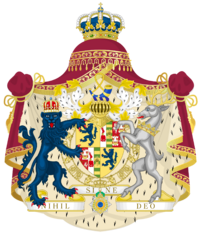Reichswehr (Mascylla)
This article is incomplete because it is pending further input from participants, or it is a work-in-progress by one author. Please comment on this article's talk page to share your input, comments and questions. Note: To contribute to this article, you may need to seek help from the author(s) of this page. |
| Imperial Defence of Mascylla | |
|---|---|
| Maskillische Reichswehr | |
 Logo of the Reichswehr | |
| Motto | Das Schwert und Schild des Reiches. (The Sword and Shield of the Realm.) |
| Founded | 29 July 1793 Current form founded on 15 April 1924 |
| Service branches | Mascyllary Army (Reichsheer) Mascyllary Navy (Marine) Mascyllary Air Force (Luftheer) Reichswehr Joint Medical Service (Reichswehrmedizinbasis) Joint Support Services (Streitkräftebasis) |
| Headquarters | Königsreh, Mascylla |
| Leadership | |
| Commander-in-Chief | Thomas Falkner (de facto) Dorothea I (de jure) |
| Minister of Defence of the Realm | Rüdiger Meißert |
| Chief of Defences | Wilhelm Brünar |
| Personnel | |
| Military age | 18 |
| Conscription | None (suspended since 2002) |
| Active personnel | 167,200 (2017) |
| Reserve personnel | 329,700 (2017) |
| Expenditure | |
| Budget | Ӄ48.7 billion (US$30.9 billion) (2019) |
| Percent of GDP | 2.2% |
| Industry | |
| Domestic suppliers | Albatross Öhrenwerftewerk Schütze & Gneisau Wiesar Verteidigung Brecht-Gühren GmBH AGA |
| Foreign suppliers | |
| Annual exports | Ӄ8.5 billion (US$4.7 billion) (2018) |
The Imperial Defence of Mascylla, or interchangibly called the Mascyllary Reichswehr (Hesurian: Maskillische Reichswehr) or simply the Reichswehr, is the armed forces of the Crowned Republic of Mascylla and their adjacent civil administration and authorities, being divided into a sole military part (armed forces or Stretkräfte) and a civilian counterpart (Zivilverwaltung). It ecompasses the Mascyllary Army (Reichsheer), the Mascyllary Navy (Marine), the Mascyllary Air Force (Luftheer), the Reichswehr Joint Medical Service (Reichswehrmedizinbasis), and the Joint Support Services (Streitkräftebasis).
Though the Monarch is traditionally the commander-in-chief of the armed forces, the Prime Minister de facto maintains this position jointly with the Minister of Defence of the Realm during peace time, although the Monarch may supersede the Prime Minister's powers by a two-thirds majority consent in the Reichsrat and on the behalf and agreement of a Councilman of Defence (Verteidigungskonsul) proposed by the government. Despite these offices having significant powers, the ability to mobilize forces is vested in the Reichsrat, which can declare a state of war, accordingly with the Ministry of Defence of the Realm.
